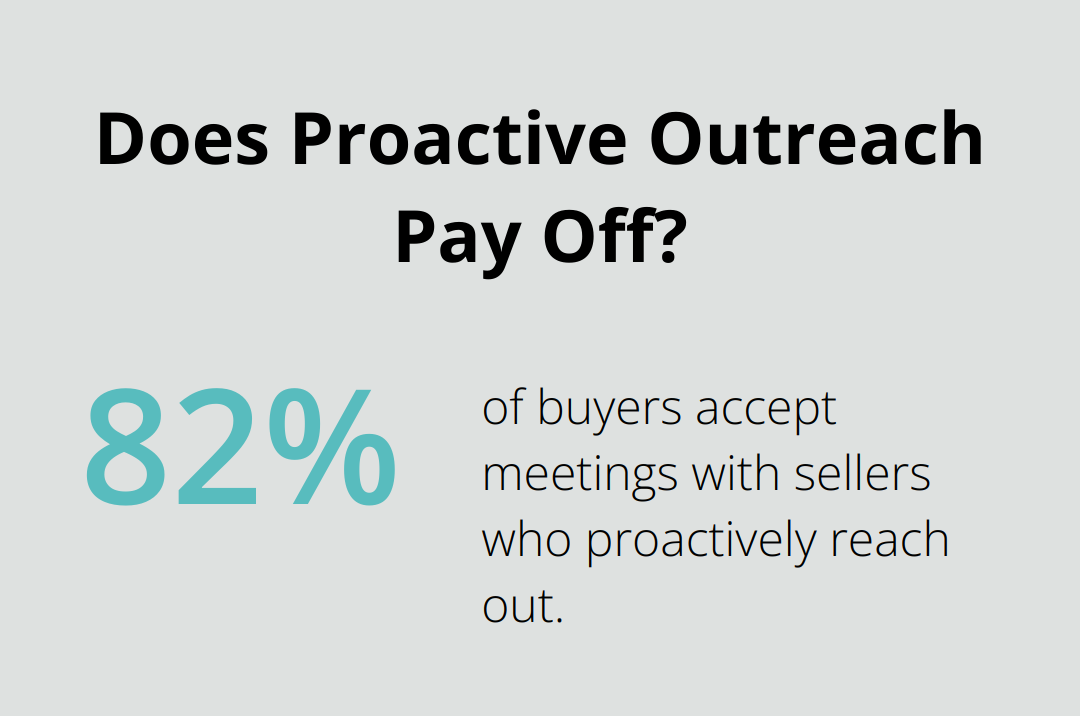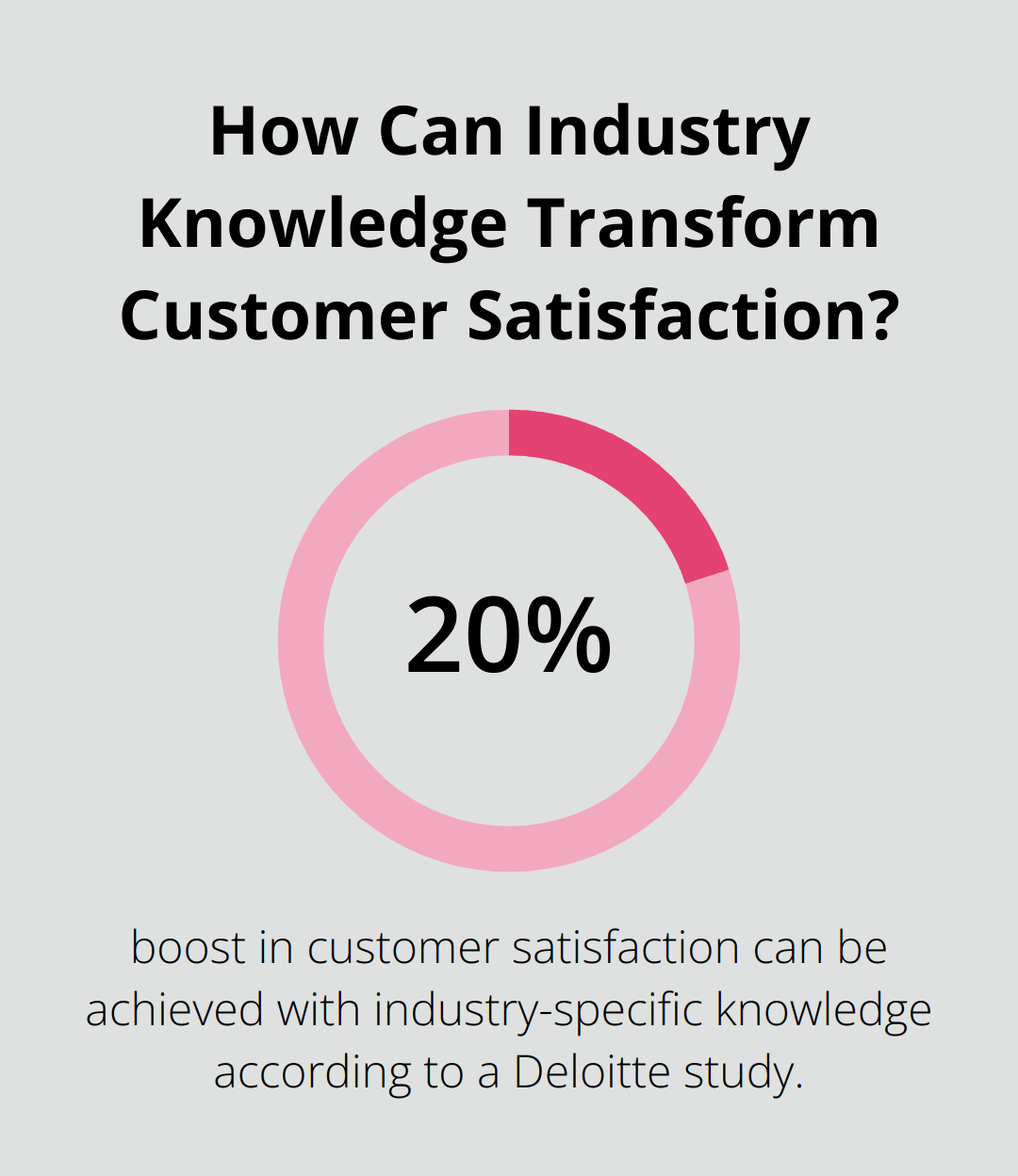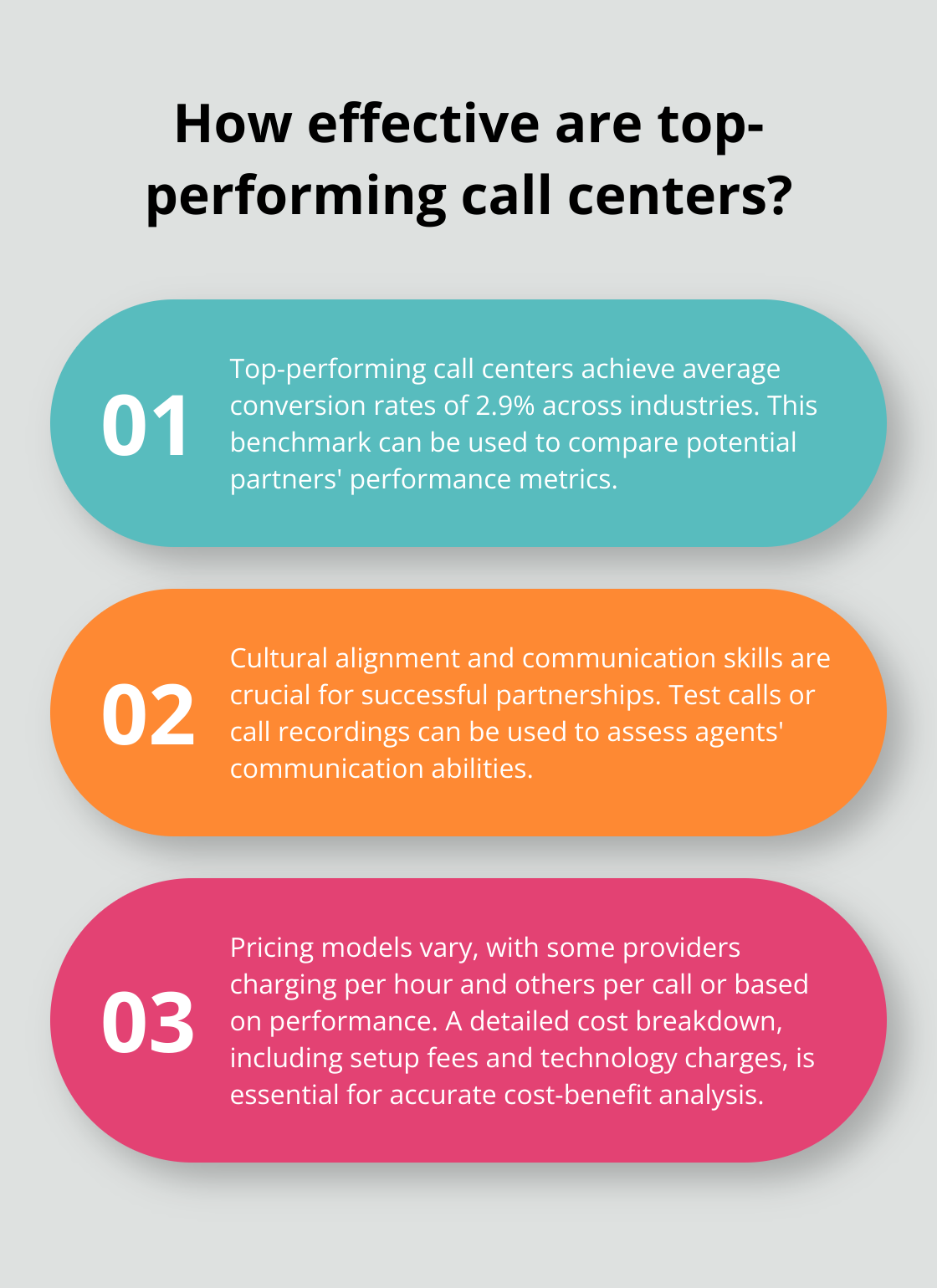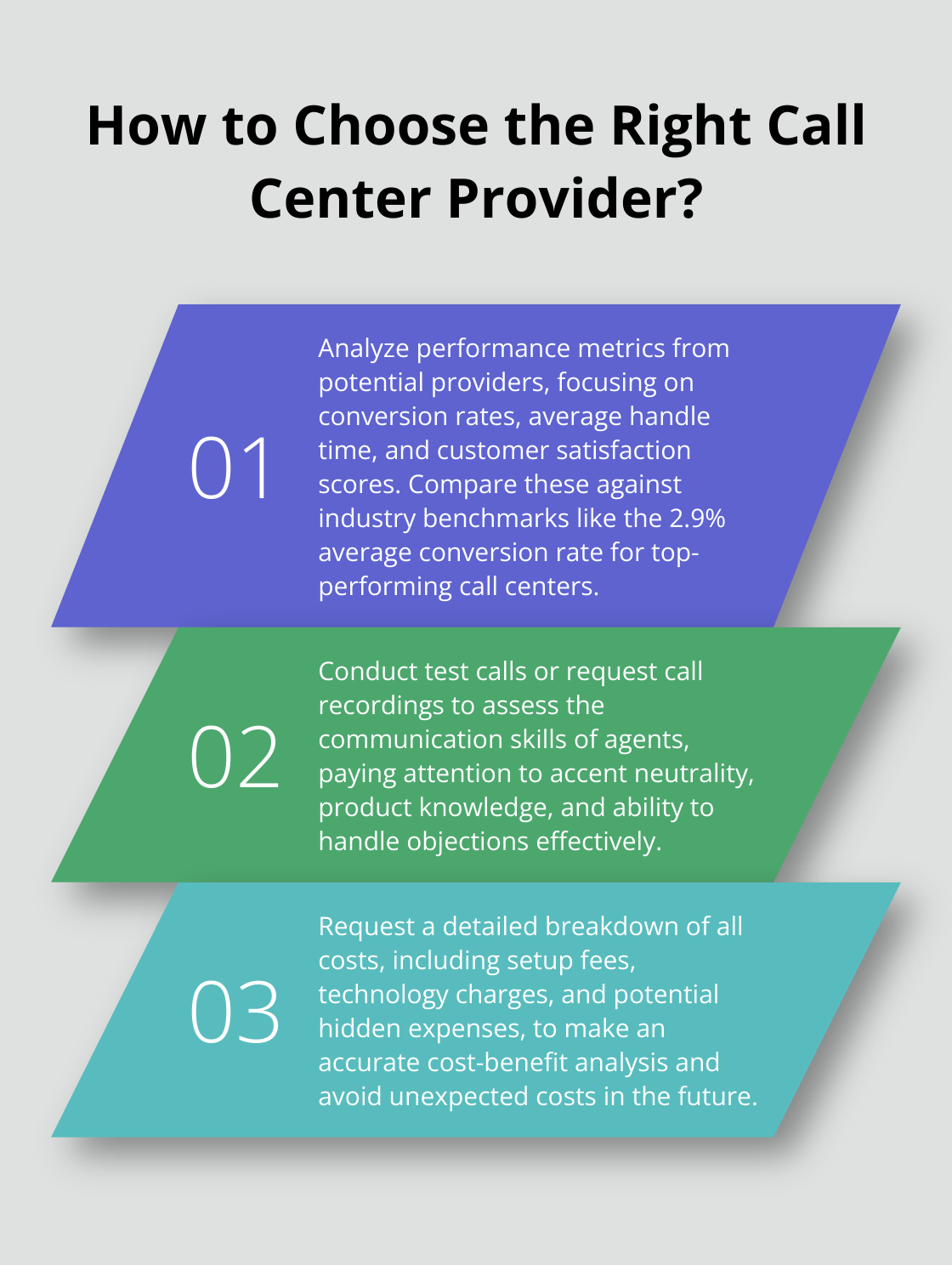Outbound call center services can make or break your customer outreach efforts. Choosing the right provider is a critical decision that impacts your business’s success and reputation.
At Outsource Consultants, we understand the challenges companies face when selecting an outbound call center partner. This guide will walk you through the essential factors to consider, ensuring you make an informed choice that aligns with your business goals and enhances your customer engagement strategies.
What Are Outbound Call Center Services?
Types of Outbound Call Center Services: What Each Motion Really Does
Not all outbound services are created equal. Each outbound motion serves a unique business objective—and the right partner should be able to tailor these to your specific goals.
Here’s a breakdown of the most common outbound call center service types:
Skilled agents reach out to potential customers to spark interest and close deals. Whether you’re launching a new product or driving campaign-specific offers, telesales teams act as your frontline for customer acquisition.
Use Case: Product launches, promotions, seasonal pushes.
Lead generation teams initiate outbound contact with a clear goal: identify, qualify, and hand off high-potential leads to your internal sales team. It’s not about closing—it’s about surfacing the right opportunities.
Use Case: Filling your sales pipeline with warm, qualified prospects.
Collections agents manage sensitive conversations to recover past-due payments while preserving customer relationships. The right provider brings empathy and professionalism to what’s often a delicate situation.
Use Case: Reducing aged receivables and improving cash flow.
Instead of cold-calling for a sale, appointment setters focus on securing a meeting between a qualified lead and your team. This is ideal for complex sales cycles where a human touch matters.
Use Case: B2B sales teams, SaaS demos, consultative selling.
Outbound agents collect customer feedback, conduct satisfaction surveys, and perform voice-of-customer interviews. The insight you gain here can fuel smarter product, marketing, and service decisions.
Use Case: Post-sale surveys, NPS tracking, competitive research.
These outbound motions can work independently or in tandem as part of a multi-touch campaign strategy. When aligned to the right KPIs and powered by skilled agents, they become a revenue-generating engine for your business.
Key Functions in Business
Outbound call centers serve as a direct line of communication between companies and their target audience. They play a vital role in business growth and customer retention. A study by the Rain Group found that 82% of buyers accept meetings with sellers who proactively reach out, a statistic that highlights the effectiveness of outbound calls in securing new business opportunities.
Importance of Selecting the Right Provider
The choice of an outbound call center provider can significantly impact your customer outreach efforts. A poor selection may result in:
- Wasted resources
- Damaged reputation
- Lost opportunities
On the other hand, partnering with a reputable provider can enhance your outbound call strategies and drive business success.
Evaluation Criteria
When assessing potential providers, consider these key factors:
- Industry expertise (e.g., experience in HIPAA compliance for healthcare sector)
- Technological capabilities
- Track record of success
- Customization options

Look for providers that offer tailored solutions to meet your specific business needs. The right partner will align with your company’s goals and values, ensuring a seamless integration of outbound call services into your overall customer engagement strategy.
As you move forward in your selection process, it’s essential to understand the specific factors that contribute to a successful outbound call center partnership. Let’s explore these critical considerations in the next section.
What Factors Matter Most in Outbound Call Centers?
Industry-Specific Expertise
A healthcare organization needs HIPAA-compliant processes. A fintech brand needs agents trained in regulatory conversations. The best providers don’t just know your vertical—they’ve lived in it.
Tip: Ask for case studies in your industry. Results matter, but so does contextual relevance.
Cutting-Edge Technology
The technology stack used by an outbound call center can significantly impact your campaigns’ success. Modern predictive dialers, CRM integrations, and analytics tools are essential for maximizing efficiency and results. Advanced AI-powered dialers can boost agent productivity by streamlining mundane or repetitive tasks. During your evaluation, request demos of their systems and inquire about their technology upgrade cycles.
Robust Quality Assurance
A strong quality assurance program maintains high standards in outbound calls. Look for providers that offer call recording, real-time monitoring, and regular performance reviews. Most call centers can benefit from scheduling a quality assurance audit every six months to a year. Ask about their QA processes, scoring systems, and how they address performance improvement.
Scalability and Flexibility
Your campaign needs will change. Choose a provider that can flex with:
-
On-demand agent scaling
-
Fast onboarding and training
-
Multi-region support for different time zones or markets
Data Security and Compliance
With increasing regulations like GDPR and CCPA, ensuring your call center partner adheres to strict data security measures is non-negotiable. A breach could cost millions in fines and irreparable damage to your reputation. Ask potential providers about their security certifications (e.g., ISO 27001), data handling procedures, and compliance training for agents. Also, inquire about their track record in maintaining compliance and any past incidents.

These factors play a significant role in determining the success of your outbound call center partnership. However, evaluating potential providers goes beyond just considering these elements. The next section will explore best practices for thoroughly assessing outbound call center providers to ensure you make the most informed decision for your business.
How to Thoroughly Evaluate Outbound Call Center Providers
Analyze Performance Metrics
Request detailed performance metrics from potential providers. Key indicators include conversion rates, average handle time, and customer satisfaction scores. Top-performing call centers achieve conversion rates of 2.9% on average across industries. Compare these benchmarks against the metrics provided by your potential partners.

Ask for specific examples of how they improved metrics for clients in your industry. A provider should demonstrate a track record of continuous improvement. They might share how they increased a client’s lead generation rate by 25% over six months through targeted script optimization and agent training.
Evaluate Cultural Alignment and Communication Skills
Cultural fit is often overlooked but essential for successful partnerships. Evaluate how well the provider’s communication style and values align with your company culture. This alignment can significantly impact the quality of customer interactions and overall campaign success.
Conduct test calls or request call recordings to assess the communication skills of their agents. Pay attention to factors like accent neutrality, product knowledge, and the ability to handle objections effectively. A provider with strong cultural alignment and excellent communication skills can act as a seamless extension of your brand.
Examine Pricing Models and Cost-Effectiveness
Hourly vs. per-call vs. performance-based—each has pros and cons. But cost is more than the hourly rate. Evaluate:
-
Ramp-up costs
-
QA investment
-
Technology fees
Sometimes paying more actually saves you more if the provider delivers better output.
Check References and Case Studies
Don’t rely solely on a provider’s sales pitch. Request references from current clients, preferably in your industry or with similar campaign types. Prepare specific questions about the provider’s strengths, weaknesses, and ability to meet KPIs.
Analyze case studies critically. Look for concrete results and methodologies used to achieve them. A case study showing how the provider increased a client’s sales by 40% should detail the strategies employed, challenges faced, and timeline for achieving results.
Consider Industry Expertise
Select a provider with proven experience in your specific industry. For example, healthcare companies should seek providers familiar with HIPAA regulations. Industry-specific knowledge can significantly impact customer satisfaction. When evaluating potential partners, ask about their experience with similar businesses and request case studies that showcase their success in your sector.
Final Thoughts: The Right Partner Isn’t Just a Vendor—They’re a Growth Lever
Selecting the right outbound call center services will significantly impact your business’s success. A well-chosen provider enhances customer engagement strategies, improves lead generation, and drives business growth. The ideal partner acts as an extension of your brand, representing your company professionally to potential and existing customers.

The selection process requires careful evaluation of industry expertise, technological capabilities, and quality assurance processes. Scalability and compliance measures also play a vital role in choosing a provider that meets current needs and adapts to future requirements. A thorough assessment ensures you connect with providers who can deliver results while aligning with your company culture and goals.
At Outsource Consultants, we help businesses find outbound call center services tailored to their specific needs. Our expertise and vetted vendor network support you in making a decision that propels your business forward. The right outbound call center partnership provides the expertise and resources needed to succeed in today’s competitive business landscape.
FAQs About Outbound Call Center Services
1. What do outbound call center services include?
They cover everything from lead generation and sales outreach to surveys, market research, and collections—any customer engagement that starts with a proactive call.
2. How can I tell if a provider has experience in my industry?
Ask for case studies and client references. Look for domain-specific compliance expertise (e.g., HIPAA, PCI-DSS) and familiarity with your customer personas.
3. What technology should an outbound call center use?
Look for modern predictive dialers, CRM integrations, AI support tools, and real-time analytics. These tools drive efficiency and improve agent performance.
4. How do I know if an outbound call center is delivering ROI?
Track performance metrics like conversion rate, lead quality, and handle time. Compare these against campaign goals and industry averages.
5. What’s the typical cost structure for outbound call services?
It varies—hourly rates, per-call billing, or performance-based pricing are all common. Evaluate the total cost of ownership, including QA, setup fees, and tech costs.






